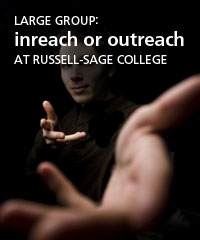You may wonder if you will ever change the world, but if you’re involved in a Christian group on campus, you have more influence that you think.
Large group: inreach or outreach?

What format should we use for our large-group meetings? This was an ongoing debate among the leaders of our InterVarsity chapter. Should we have speakers and Bible teaching, or should we focus on outreach through seeker-sensitive topics? Are these mutually exclusive? As we brainstormed ideas for chapter meetings that stimulated our faith and appealed to our non-believing friends, our focus changed — and that changed everything.
Eventually our leadership team agreed that the large-group meetings are a great place to do outreach by presenting topics that would appeal to our whole campus at Russell Sage College and Rensselear Polytechnic Institute (NY). Our seeker-sensitive topics have included depression, sex, servanthood, addiction and issues of the heart. It’s easy for us to invite our friends and we have lively conversations about things that matter to all of us.
When we changed our format, we experimented with four different models for our large-group meeting:
- A movie night followed by a discussion.
- A speaker followed by a question-and-answer time.
- Entirely discussion-based
- Games and fun activities
The formats we’ve used most are a speaker or a discussion, but we use all four of these models occasionally. We prefer the discussion model because it makes the seekers in our audience most comfortable and fits our campus culture.
We also make sure to tie in our chapter vision to every talk we do. Our newest way of doing this is by having a “sum up” at the end of our meeting. One of our leaders explains how the topic ties in to our vision. We are upfront about what we believe and why we believe it.
Welcoming new people
Our chapter wants visitors at our meetings to be welcomed so we created a hospitality committee. They greet people at the door of our meeting room and give out welcome bags. Our welcome bags have miscellaneous, humorous items with descriptive notes attached. For example, the bags include a penny “to start paying back your student loans,” a soda “for your late night caffeine fix,” and ramen noodles to “have dinner on us.”
Our leadership team decided to initiate ideas for meeting new people. After our time of worship, we have a fifteen minute break and ask people to go meet someone they don’t know. At the beginning of our meetings, the large-group coordinator makes a point of asking people to move forward and mix by sitting with someone they haven’t meet before, or with someone of the opposite gender, or … well, you get the idea.
Hanging out after the meeting
Post-events are an important way to develop relationships with the people coming to our chapter meetings. Our members are encouraged to bring their friends so we have Christians and non-Christians coming to both our large-group meeting and post-events. We believe that the key to being a dynamic group on campus is to have members from all walks of life, whether they are Christians or not. A supportive community for everyone is central to our fellowship and to our purpose. We hope that these post-events will lead to deeper relationships and eventually to spiritual discussions.
Our post-events are generally fun and games because our large-group discussions are usually serious. Offering enjoyable late-night events is an effective way to compete with parties on campus. We believe the fun aspect is just as important as the serious, so we want to have a great time together after we have had a serious discussion in our large-group time.
By changing the focus of our large-group meetings and intentionally welcoming newcomers, people connected with our chapter are opening up to God’s work in their lives, both believers and non-believers. We are transforming members of a transforming chapter, hoping to transform our campus with the grace and truth of Jesus.
—Heather Allen
Read more about additional changes made by the InterVarsity group to improve their reputation and serve their campus.






